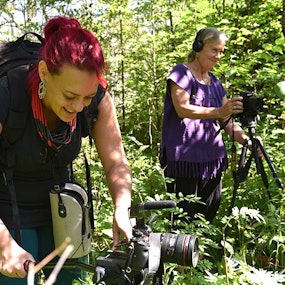
Sign up to get updates from us
By signing up, you agree to receive email from this podcast.

Deborah Barndt
“Perhaps my introduction to participatory researchtook place at our dining room table in Ohio in the 1950s when my parents would hold a weekly Family Council meeting, so we could talk about problems arising and make decisions together about what we wanted to do. Fast forward to the 1970s when I do doctoral research on Paulo Freire’s ideas and praxis of popular education in Peru, and return to Toronto, Canada, to join the Participatory Research Group of the International Council for Adult Education. Working in Nicaragua during the early years of the Sandinista Revolution deepened my understanding of how participatory research and popular education were integral to building social movements and creating a new society. In the late 1980s, working with other Toronto activists in The Moment project, we brought the arts (music, theatre, visuals) into our processes of “naming the moment” (based on Gramsci’s notion of conjunctural analysis) and building coalitions to fight free trade, defend Indigenous rights, challenge police racism.
From 1993 on, I brought participatory research, popular education, and community arts into the university where I taught in the Faculty of Environmental Studies at York University in Toronto. I continue to struggle to integrate my artist, activist and academic selves. All of my research projects have been participatory and arts-based – whether tracing the journey of a corporate tomato from Mexico to Canada through the eyes of women workers (Tomasita Project) or coordinating the participatory research of 4 NGOs and 4 universities on the use of the arts in social movements (VIVA! Project). Most recently, I’ve been coordinating the Earth to Tables Legacies Project, an intergenerational and intercultural exchange of Indigenous and settler activists for food justice and food sovereignty from Mexico and Canada. This art-based collaborative research resulted in a multimedia educational website earthtotables.org and a forthcoming book (Rowman & Littlefield). It has offered my most humbling and profound learning in dialogue with Haudenosaunee partners in Canada, and Mayan and P’urépecha partners in Mexico, as we deconstruct and attempt to transform the colonial institutions, practices, and ways of knowing – and relearn how to respect and connect with “all our relations” and the sacred Mother Earth in the face of the climate crisis. I’m finding that the relational and process-oriented ways of thinking/being/acting in Indigenous cosmologies often converge with and enrich the efforts of feminist participatory action researchers."
Select Publications
Barndt, Deborah (1980). Education and social change: A photographic study of Peru. Whitby: Kendall-Hunt.
Barndt, Deborah, Feme Cristall and dian marino (1982). Getting there: Producing Photo-stories with immigrant women. Toronto: Between the Lines.
Barndt, Deborah (1991). To change this house: Popular education under the Sandinistas. Toronto: Between the Lines and the Jesuit Centre and the Doris Marshall Institute for Education and Action. Spanish edition 1995.
Barndt, Deborah (Ed.). (1999). Women working the NAFTA food chain: Women, food, and globalization. Toronto: Sumach Press.
Barndt, Deborah (2001). On the move for food: Three women behind the tomato's journey. Women's Studies Quarterly 29, no.1-2, pp. 131-143.
Barndt, Deborah (2004). By whom and for whom? Intersections of participatory research and community arts. In A. Cole, L. Neilsen, J.G. Knowles, T. Luciani (Eds.). Provoked by art: Theorizing arts-informed Inquiry. Toronto, OISA: Backalong Books and Centre for Arts-Informed Research.
Barndt, Deborah (Ed.) (2006). Wild fire: Art as activism. Toronto, Ontario: Sumach Press.
Barndt, Deborah and Christine McKenzie (2006). Whose Nicaragua? Popular communications across eras, regions, and generations. pp. 46-57. In Deborah Barndt. Wild Fire: Art as Activism. Toronto: Sumach Press 46-57.
Barndt, Deborah (2008). Touching minds AND hearts: Community arts as collaborative research. pp. 351-362. In J. Gary Knowles and Ardra L. Cole (Eds.) Handbook of the arts in qualitative research; Perspectives, methodologies, examples, and issues. Thousand Oaks, CA: SAGE Publications.
Barndt, Deborah (2008). Tangled routes: Women, work, and globalization on the tomato trail. Rowman & Littlefield.
Barndt, Deborah and VIVA! Project Partners (2010). VIVA! El Arte Comunitario y La Educación Popular en las Americas. Bluefields, Nicaragua: URACCAN.
Barndt, Deborah and Laura Reinsborough (2010). Decolonizing art, education and research in the VIVA! Project. In L. Davis (Ed.) Alliances: Re/Envisioning relationships between Aboriginal and Non-Aboriginal Peoples. Toronto: University of Toronto Press.
Barndt, Deborah and VIVA! Project Partners (2011). VIVA! Community arts and popular
education in the Americas. Albany, NY: SUNY Press and Between the Lines.
Barndt, Deborah (2012) Remapping the Americas: A transnational engagement with creative tensions of community arts. pp 166-191. In Amanda Lock Swarr and Richa Nagar (Eds). Critical transnational feminist praxis. SUNY Press.
Barndt, Deborah (2014). Shooting back: Photo voice in action research. In David Coghlan and Mary Brydon-Miller (Eds.). Encyclopedia of Action Research. Thousand Oaks, CA: SAGE Publications.
Barndt, Deborah, Lauren Baker, Alex Gelis, and Legacies Collaborators. (Forthcoming – 2023)
Earth to tables legacies: Multimedia food conversations across generations and Cultures. Lanham, Maryland: Rowman & Littlefield Publishers. Accompanying website: www.earthtotables.org
In this episode Deborah Barndt and Margarita Antonio discuss their collaboration on a participatory arts-based research project called VIVA! in Nicaragua the early days of URACCAN - the University of the Autonomous Region of ...